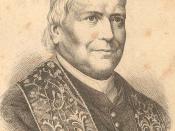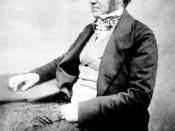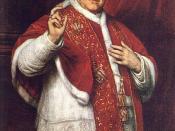`Why did Charlemagne accept the imperial title?'
The great religious questions of the nineteenth century were in many cases rooted in the events of the eighteenth. The Enlightenment, characterized by an intellectual zeal and a rebellious atheism, set down the foundations upon which the next century's crisis of faith was to be built. As the years passed, science brought to the public's attention discoveries which appeared to undermine the dogmas expounded by the churches, whilst thinkers unveiled new concepts of government and morality which did not require the Church, or even a deity. The nineteenth century was the offspring of the Industrial Revolution; it was the home of Darwin and Marx; and, according to Nietzsche's `Madman' in the marketplace, it was the scene of a cultural assassination: `God is dead. God remains dead. And we have killed him.'
Modern historians, in addressing the effect of science on religion during the course of the nineteenth century, have tended to employ two terms: `religious science' and `irreligious science' .To
some, this distinction may appear unnecessary, since science as a process of discovery is not generally taken to overlap with theology. However, when a schism began to appear in society between those willing to defend their inherited faith, and those unwilling to do so (and in many cases convinced that it was their duty to launch an assault on religion), scientists too tended to take sides, developing arguments out of the evidence which their research presented them with. The most important scientific development - that of Darwin, with his theory of evolution by natural selection - was neither `religious' nor `irreligious' at the outset. It was only when it was interpreted that it began to appear to pose a threat to the beliefs of those who regarded the Genesis account of Creation...


